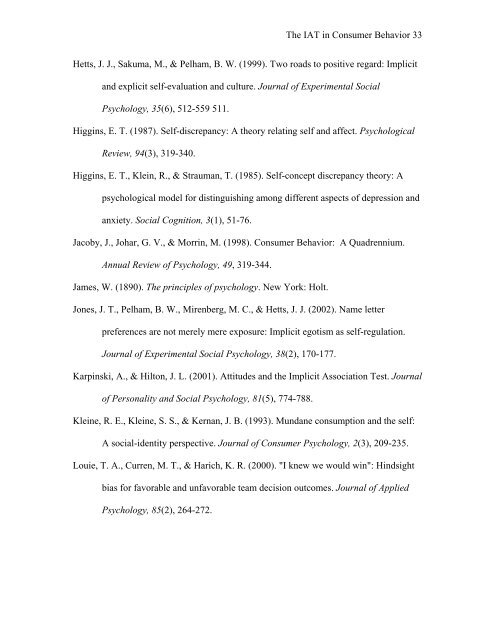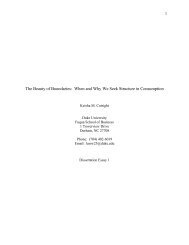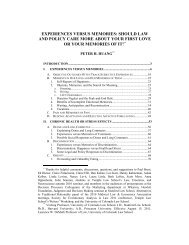RUNNING HEAD: The IAT in Consumer Behavior - Wharton Marketing
RUNNING HEAD: The IAT in Consumer Behavior - Wharton Marketing
RUNNING HEAD: The IAT in Consumer Behavior - Wharton Marketing
Create successful ePaper yourself
Turn your PDF publications into a flip-book with our unique Google optimized e-Paper software.
<strong>The</strong> <strong>IAT</strong> <strong>in</strong> <strong>Consumer</strong> <strong>Behavior</strong> 33Hetts, J. J., Sakuma, M., & Pelham, B. W. (1999). Two roads to positive regard: Implicitand explicit self-evaluation and culture. Journal of Experimental SocialPsychology, 35(6), 512-559 511.Higg<strong>in</strong>s, E. T. (1987). Self-discrepancy: A theory relat<strong>in</strong>g self and affect. PsychologicalReview, 94(3), 319-340.Higg<strong>in</strong>s, E. T., Kle<strong>in</strong>, R., & Strauman, T. (1985). Self-concept discrepancy theory: Apsychological model for dist<strong>in</strong>guish<strong>in</strong>g among different aspects of depression andanxiety. Social Cognition, 3(1), 51-76.Jacoby, J., Johar, G. V., & Morr<strong>in</strong>, M. (1998). <strong>Consumer</strong> <strong>Behavior</strong>: A Quadrennium.Annual Review of Psychology, 49, 319-344.James, W. (1890). <strong>The</strong> pr<strong>in</strong>ciples of psychology. New York: Holt.Jones, J. T., Pelham, B. W., Mirenberg, M. C., & Hetts, J. J. (2002). Name letterpreferences are not merely mere exposure: Implicit egotism as self-regulation.Journal of Experimental Social Psychology, 38(2), 170-177.Karp<strong>in</strong>ski, A., & Hilton, J. L. (2001). Attitudes and the Implicit Association Test. Journalof Personality and Social Psychology, 81(5), 774-788.Kle<strong>in</strong>e, R. E., Kle<strong>in</strong>e, S. S., & Kernan, J. B. (1993). Mundane consumption and the self:A social-identity perspective. Journal of <strong>Consumer</strong> Psychology, 2(3), 209-235.Louie, T. A., Curren, M. T., & Harich, K. R. (2000). "I knew we would w<strong>in</strong>": H<strong>in</strong>dsightbias for favorable and unfavorable team decision outcomes. Journal of AppliedPsychology, 85(2), 264-272.




